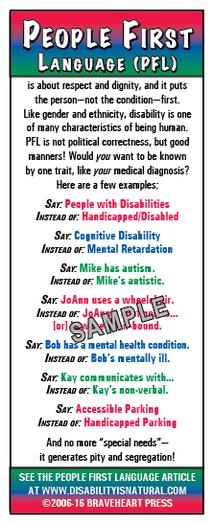
For too long, people who happen to have conditions we call “disabilities” have been subjected to devaluation, marginalization, prejudice, and more. And the first way to devalue someone is through language, by using words or labels to identify a person/group as “less-than,” as “the other,” “not like us,” and so forth. Once a person/group has been identified this way, it makes it easier to justify prejudice and discrimination. Our language shapes our attitudes; our attitudes shape our language; they’re intertwined. And our attitudes and language drive our actions!
- See the article by Kathy Snow, The Case Against “Special Needs” for a discussion about how those terms have been used and why we might not want to use them in the futures.
- People First Language (PDF)
That old “sticks and stones” saying is wrong: words are powerful and they can hurt! Other civil rights movements generated changes toward more respectful and accurate language and attitudes; the Disability Rights Movement is doing the same, beginning with People First Language. (This is the 4-page version, with examples.)
